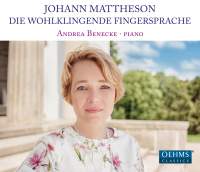Texte paru dans: / Appeared in: |
|
|
Outil de traduction ~ (Très approximatif) |
|
|
Reviewer: Scott
Noriega Johann Mattheson (1681–1764) is perhaps best known today as a music theorist. The student of musical history may know him through his writings, among the most important Der vollkommene Capellmeister (The Perfect Chapelmaster) of 1739. A lover of all that was new and modern—especially dramatic music—the treatise detailed a number of important musical concepts and opinions: the importance of melody; the systemization of the doctrines of rhetoric as the basis for composition; the importance of the Affections; along with a new understanding of consonance and dissonance in counterpoint. But the erudite student of music history may know him, too, in more infamous ways. According to Mattheson, so the story goes, during a performance of his own Cleopatra in Hamburg in 1704, Handel was asked to perform the duties as conductor and harpsichordist while Mattheson sang the role of Antonius on stage. After the character’s suicide, Mattheson returned to the orchestra to play harpsichord and conduct the rest of the music himself. Handel flatly refused to relinquish his position. An argument ensued and finally a duel involving swords. Handel’s life was spared when a large button on his coat caught the tip of Mattheson’s blade. The two were soon reconciled, however, as Mattheson sang the lead roles in two of Handel’s operas in 1705— Nero and Almira—shortly before he left the company. Though dramatic music was his true passion—he wrote a number of operas and over 30 oratorios—Mattheson also produced a few chamber works and some keyboard music as well. Oddly his largest work for harpsichord, Die Wohlklingende Fingersprache (The Harmonious Language of the Fingers), is filled not with galant-style compositions, but rather 12 double fugues (the first publication of this type of work), along with a fughetta, and a number of dance-suite movements throughout to help lighten the mood. Throughout this recital Andrea Benecke is wise to highlight the melodic elements in this music, producing a light and airy tone, and using little pedal to allow the counterpoint to unfold clearly and naturally. I question some of her choices though: The tempos throughout are relatively similar. She argues that “too-large contrasts would endanger the balance and architecture of the whole.” But perhaps a bit more contrast might also help clarify and define certain sections of the work better and overall make the whole more palatable in large doses. The whole opus takes just a bit over an hour—all that in basically one tempo. And while the pianist seems to find this music as mostly polite, a bit more energy wouldn’t exactly hurt her cause. Where is the drama that Mattheson so loved? The small and much-earlier sonata which ends the recital seems misplaced. Perhaps it would have been better to begin the recital with the work than to end with it. While certainly charming, there is little to remember after the work has concluded. And oddly the sonata, seemingly the least technically challenging piece on the recital, seems to pose the most difficulties for the pianist. Her passagework here is often sloppy, her hands out of sync in most of the double-scale runs. This is, then, primarily a release for those interested in broadening their understanding of the early 18th century and the many composers writing for the keyboard other than the triumvirate of Bach, Handel, and Scarlatti. While some of the individual works heard here are at times interesting, there is little to bring one back to listen to this opus in its entirety as I do often the Well-Tempered Clavier or the The Art of Fugue. I simply find Bach’s music intellectually more thought-provoking and more satisfying emotionally. The same can be said of both Handel and Scarlatti in large doses. | |
|
|
|
|
Cliquez l'un ou l'autre
bouton pour découvrir bien d'autres critiques de CD |
|




